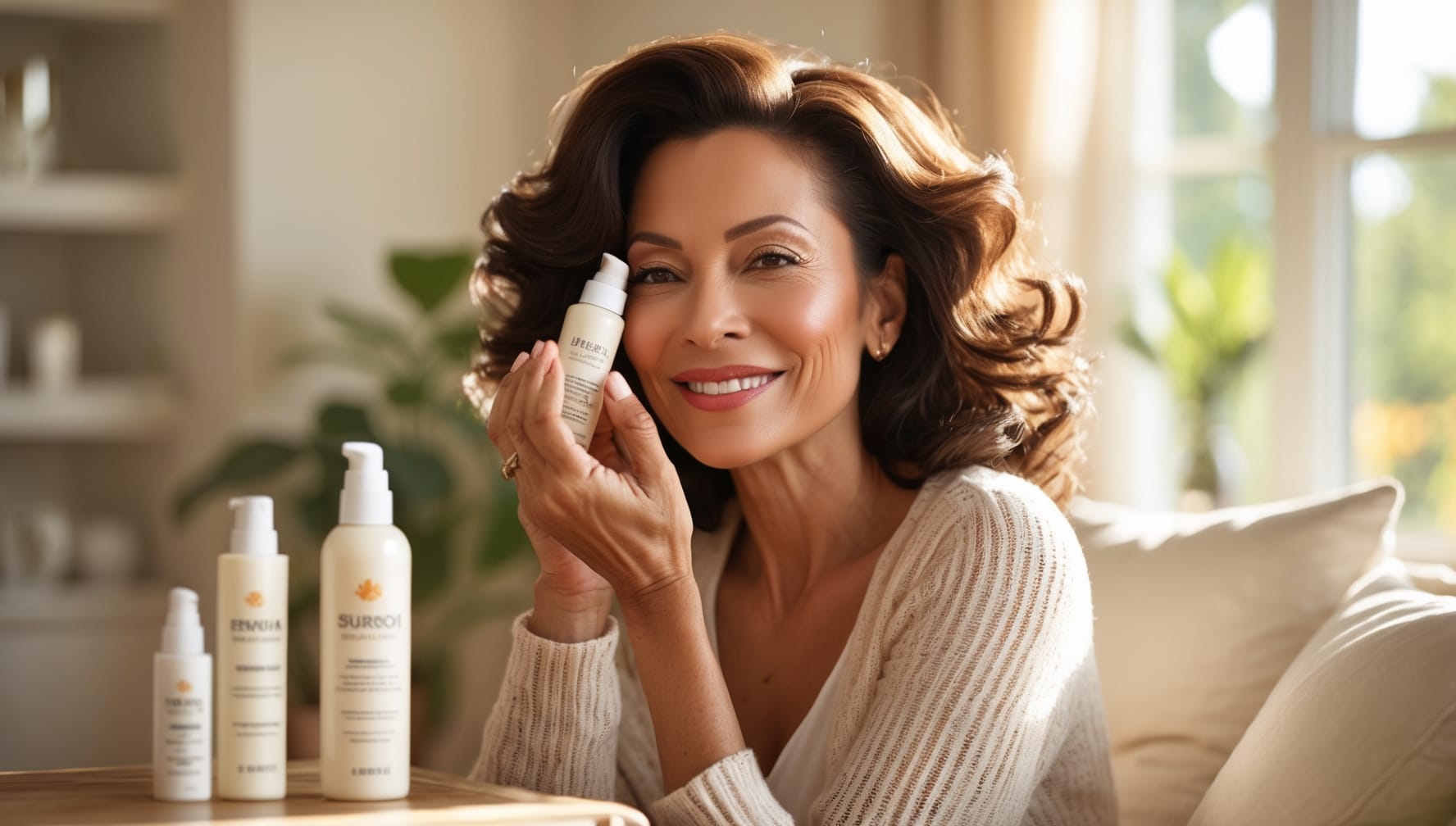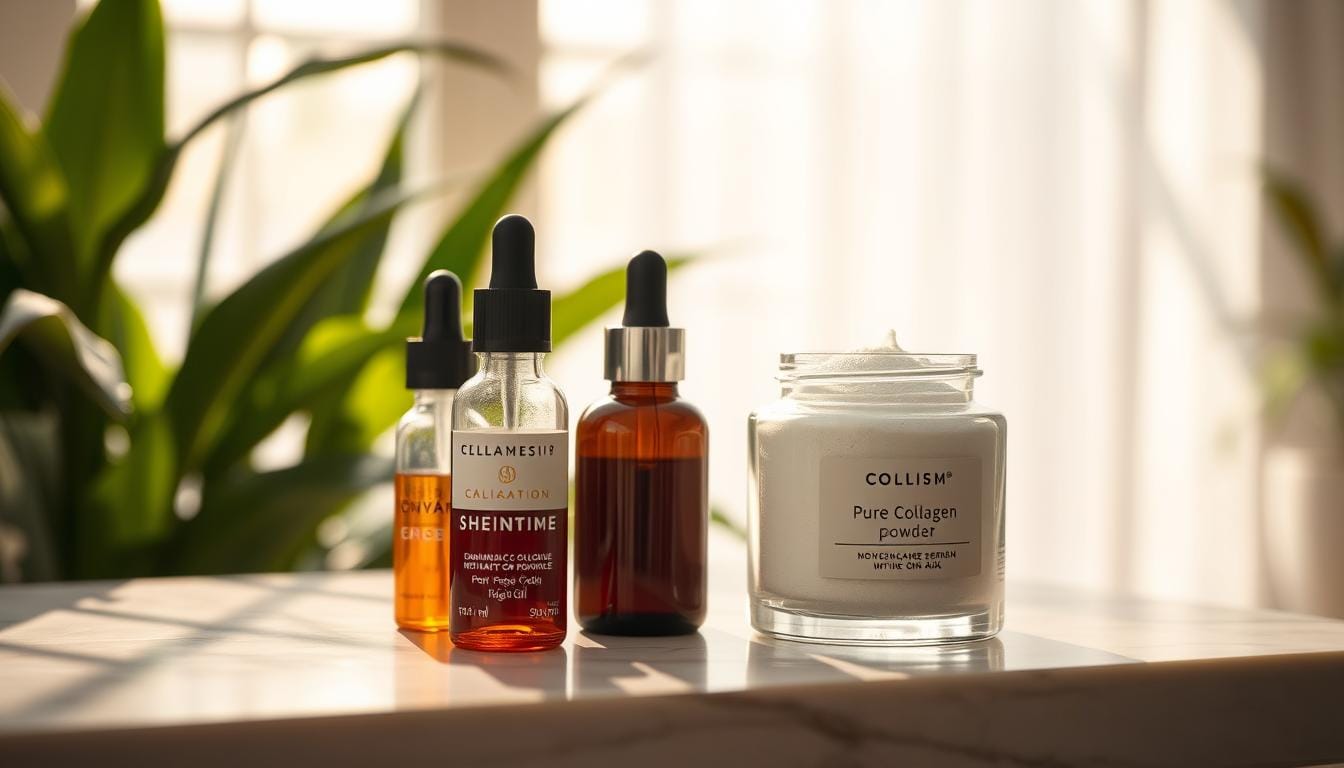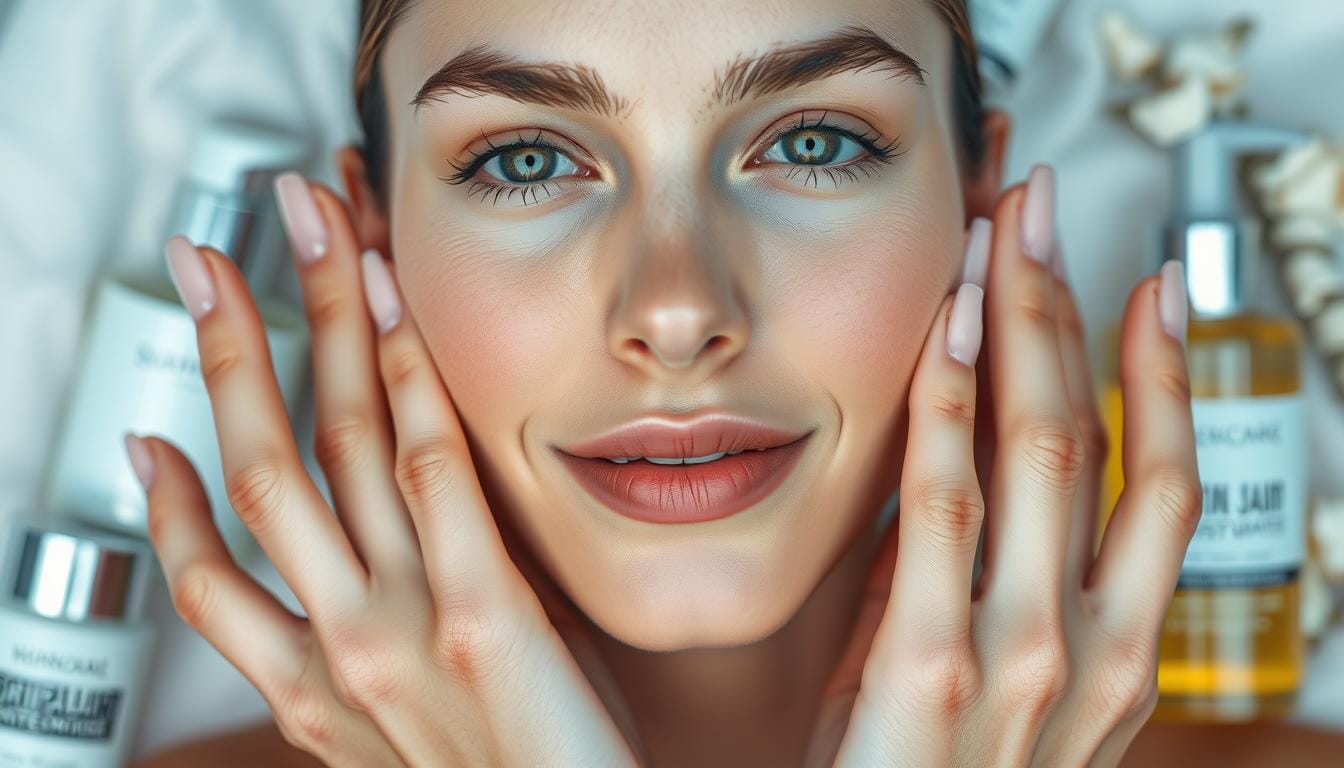Manage Hair & Skin Changes After Menopause
Menopause brings big changes to your skin and hair due to lower estrogen levels. Learn how to manage dryness, thinning hair, and sensitivity with expert tips on skincare, hair care, and lifestyle adjustments. Discover how to feel confident and radiant through every stage of menopause!

Menopause marks the end of a woman's menstrual cycles. It brings big changes, mainly in hair and skin. This change, happening between 45 and 55 years old, lowers estrogen levels. This can make skin and hair look less youthful.
Women might see their skin get dry and thin. Hair can also thin out, grow in unwanted places, and lose volume. To handle these changes well, it's important to take action. Dermatologists suggest ways to keep looking and feeling good during this time.

Key Takeaways
- Lower estrogen levels during menopause can lead to skin that appears thinner, saggy, and more wrinkled.
- Implementing a daily regimen including broad-spectrum SPF 30 or higher is essential for protecting the elasticity and plumpness of aging skin.
- Maintaining skin moisture through daily use of hydrating moisturizers can help lessen the appearance of wrinkles.
- Menopause has been shown to bring about significant hair texture and volume changes, affecting up to 50% of women.
- Diet and lifestyle adjustments, alongside the careful selection of hair and skin care products, are vital in alleviating the effects of menopause.
- Routine exercise, sufficient sleep, and stress management are important factors in nurturing healthier skin and hair post-menopause.
- Consulting with healthcare providers about treatments such as HRT and supplements can provide additional support during this transition.
👉 Feeling overwhelmed by menopause changes? Get the guidance you need!
Discover expert tips and natural solutions in Embrace the Change: Women's Post-Menopausal Health Guide — your go-to resource for managing skin and hair changes with confidence.
Understanding Menopause: Hormones, Hair, and Skin
Menopause is a big change in a woman's life, mainly because of hormonal changes. These changes affect skin and hair a lot. It happens between 45 and 55 years old, with most women starting at 51.5 years.
As estrogen levels go down, skin gets less elastic and drier. Hair growth slows down too, making hair look different in texture and volume.
It's important to know about these hormonal changes to manage skin and hair after menopause. Estrogen helps hair grow longer. But when it goes down, hair falls out more and gets thinner. This can lead to hair loss, mainly on the front of the scalp.
Also, hormonal changes make soft body hair grow thicker. This means more facial hair for about half of women after menopause.
For the skin, estrogen's drop means a 30% less collagen in the first five years after menopause. This makes skin less firm and more prone to dryness and wrinkles. Skin aging signs can start as early as 30, but they get worse after menopause because of the big drop in estrogen.
- Importance of tailored hair care post-menopause: Hair care needs change after menopause. It's important to pick the right products for thinning hair and take care of the scalp. This helps with the effects of less estrogen.
- Hormonal influence and skin care: Just like with hair, knowing how hormones affect the skin during menopause is key. Keeping skin hydrated with moisturizers and special treatments can help with dryness caused by less estrogen.
Hormonal changes in menopause affect both skin and hair a lot. So, making informed choices and adapting skincare routines is very important during these years.
The Impact of Hormonal Changes on Your Skin
Menopause is a big change in a woman's life. It brings many changes that affect the skin. Knowing these changes helps in taking good care of your skin after menopause.
Hormonal changes affect how elastic and moist your skin is. This means you need to change your skin care routine. It's important to adapt to these changes.
Why Skin Dryness and Sagging Occurs
Menopause means less estrogen, which affects sebum and collagen. These are key for keeping skin hydrated and firm. Without them, skin gets dry and starts to sag.
It also shows more wrinkles, like on the neck and cheeks. Using moisturizer every day is very important.
Managing Increased Sensitivity and Irritation
Dealing with sensitive skin means using gentler products. The skin's barrier weakens with less estrogen. This makes it more likely to react to things.
It can get red, itchy, or even get eczema. Using products made for sensitive skin can help a lot.
Combatting Thinning Skin
Thinning skin needs more than just creams. It's about taking care of your skin from the inside out. Using products with hyaluronic acid and retinol helps.
These ingredients help make your skin thicker and more elastic. They boost collagen production, which drops during menopause. Also, using sunscreen helps protect thinner skin from UV damage.
Adding these tips to your daily routine can help a lot. It's all about taking care of your skin in a way that suits its new needs. This not only helps with symptoms but also boosts your confidence and well-being.
Navigating Hair Texture and Volume Changes Post-Menopause
Menopause brings big changes, not just in stopping periods but also in hair. It's key to know these changes to keep your hair healthy and full of life.
Menopause hair thinning and hair loss menopause are big worries for many women. About 40% face these issues. You might see your hairline widening or your ponytail getting thinner. Hormonal shifts, like less estrogen, play a big role in these changes.
Starting new hair care routines is a must during menopause. Using gentle, moisturizing products can help with dryness and breakage. Here are some tips:
- Moisturizing Shampoos: Shampoos like Shampooing Crème Moelle de Bambou can tame frizz and add moisture.
- Volumizing Products: For limp hair, Shampooing Énergisant can add volume and shine.
- Scalp Treatments: Regular use of Régénerescence Naturelle can improve scalp health and hair growth.
- Styling Products: Lait Luminescence is great for smooth, nourished hair.
Changing your hair care routine isn't all about products. Washing your hair less often can keep it moisturized. Dry shampoos can help keep your hair clean without washing it too much.
Adapting to these changes and adjusting your hair care can make a big difference. Starting these routines early can help keep your hair looking great.
Menopause is a natural part of life, and with the right care, you can stay confident and beautiful. By taking care of your changing hair, you're showing love and care for yourself.
Revolutionizing Your Skincare Routine After Menopause
Changing your skincare routine after menopause is key. It's not just good, it's necessary. You need to pick the right moisturizers and protect your skin from the sun. This helps with the skin's loss of strength and its increased sensitivity to the sun.
Choosing the Right Moisturizers
Looking for the right moisturizers after menopause is important. You want ones that deeply hydrate and add back lost nutrients. Hyaluronic acid is great because it pulls moisture into your skin, fighting dryness from lower estrogen levels.
A good moisturizer should also help keep moisture in your skin. This prevents it from getting even drier.
The Role of Sun Protection
Sun protection is vital for your skin's health after menopause. Your skin gets thinner and more sensitive, making it more prone to sun damage. Use a broad-spectrum sunscreen with at least SPF 30 every day.
This protects your skin from harmful UVA and UVB rays. It helps prevent early aging and wrinkles, common issues after menopause.
Adjusting your skincare routine for menopause means knowing what your skin needs now. With the right moisturizers and sun protection, you can keep your skin looking great and healthy, even with hormonal changes.
| Concern | Recommended Solution |
|---|---|
| Dryness and Thinning | Hyaluronic acid-based moisturizers, regular hydration |
| Sun Damage | Daily application of broad-spectrum SPF 30+ sunscreen |
| Collagen Reduction | Products that boost collagen production like peptides and retinoids |
| Sensitivity and Irritation | Gentle, fragrance-free products to minimize reactions |
Managing Hair and Skin Changes After Menopause
Handling managing hair and skin changes after menopause can be tough. But, setting up a menopause skincare routine and adjusting your hair care post-menopause can ease the transition. After menopause, women lose collagen fast, causing skin to sag and dry out. Hair thinning also becomes a big issue due to hormonal shifts affecting hair follicles.
To tackle these changes well, it's key to use targeted strategies for both hair and skin health. Using broad-spectrum sunscreen with SPF 30 or higher protects against skin cancer and slows down skin aging from UV exposure. Hydrating skin products can help with dryness, and special hair treatments can fight hair thinning.
Here's a detailed table with important stats and tips for keeping hair and skin healthy after menopause:
| Statistic | Recommendation |
|---|---|
| 30% collagen loss in the first 5 years of menopause | Use collagen-boosting products like retinoids and peptide complexes |
| Skin hydration ability decreases | Increase intake of water & use products with hyaluronic acid |
| pH level changes leading to sensitivity | Switch to hypoallergenic skin care products |
| Increased face and chin hair growth | Consider laser hair removal or topical treatments |
| Onset of menopause-acne | Use non-comedogenic skincare and consult dermatologist |
| Hair loss and thinning | Revise your diet to be rich in vitamins and consider minoxidil |
Keep in mind, everyone's skin and hair react differently after menopause. Getting advice from a healthcare provider or dermatologist can help tailor these tips to fit your needs. Some might find great benefits from treatments like laser therapies or hair transplant procedures for severe cases.
By following these steps, you can effectively manage hair and skin changes after menopause and boost your overall health. Stay proactive about your health, and don't hesitate to seek professional advice to keep your beauty and confidence.
Tackling Menopause-Related Hyperpigmentation
Women going through menopause often see more skin pigmentation issues. This can lead to age spots and worsen sun damage. It's important to understand how hormones affect the skin to manage these changes.
Age spots, often caused by sun exposure, are common in menopausal women. These spots and uneven skin tone come from hormonal changes. These changes affect how the skin produces melanin, leading to darker patches.
Understanding Age Spots and Sun Damage
UV rays can make aging signs worse, known as photoaging. During menopause, the skin is more vulnerable to UV rays. This is because it thins and loses natural oils. Using sunscreen well is key to prevent new spots and lower cancer risk.
Effective Treatments and Preventative Measures
- Regular use of broad-spectrum sunscreen with a high SPF to shield skin from further UV damage.
- Application of topical agents containing ingredients like hydroquinone, retinol, and vitamin C, which have been found effective in reducing dark spots and improving overall skin complexion.
- In-office dermatological procedures such as chemical peels, microdermabrasion, and laser therapy can be employed to diminish the appearance of hyperpigmentation significantly.
- Adopting a skincare routine that includes exfoliating products to remove dead skin cells, thereofore promoting the regeneration of new, healthier skin cells.
Keeping up with a treatment plan and using preventative steps can help with menopause-related hyperpigmentation. It's important to talk to a dermatologist to find the right treatment for your skin.
Addressing Hair Growth in Unwanted Areas
Many women face unwanted facial hair during and after menopause. Hormonal changes cause androgen levels to rise while estrogen falls by 20-30%. This imbalance leads to more hair on the chin, jawline, and upper lip. Knowing this can help find the right treatments.
Looking into different hair removal methods is key for hair growth menopause issues. Laser hair removal is very effective, reducing hair by about 80% after several sessions. A dermatologist can offer personalized advice, as waxing may not work as well with skin changes.
| Treatment Method | Effectiveness | Average Sessions Needed |
|---|---|---|
| Laser Hair Removal | 80% reduction | 6-8 |
| Electrolysis | 15-50% permanent reduction | Varies |
The need for hair removal treatments is growing fast. The market is expected to grow by 7.5% from 2021 to 2028. About 40% of postmenopausal women seek medical help for hair growth, showing how important these treatments are.
While talking about hair removal, we must also think about its emotional side. About 15% of women feel very upset by more hair. This makes it even more important to have good treatments and support during menopause.
Menopause Skincare: Hydration is Key
Women going through menopause see a big drop in oestrogen. This affects their skin's hydration and elasticity. It's important to use the right skincare to keep the skin moist and young.
Using menopause skincare with hydrating cleansers is a good start. These cleansers add moisture back to the skin. Look for products with glycerin or hyaluronic acid to help keep the skin moist.
After cleansing, it's key to add more moisture. Serums and creams with antioxidants like Vitamin C help. They fight off free radicals and keep the skin moist. Make sure these products are free from harsh chemicals and fragrances to avoid irritation.
| Product Type | Key Ingredients | Benefits |
|---|---|---|
| Hydrating Cleansers | Glycerin, Hyaluronic Acid | Helps maintain skin's moisture barrier |
| Moisturizing Serums | Vitamin C, Antioxidants | Protects against free radicals, boosts collagen production |
| Nourishing Creams | Peptides, Ceramides | Enhances skin texture and resilience |
Choosing products made for menopausal skin is smart. Look for ones with omega fatty acids and phytoestrogens from wild yam. They help with hydration and overall skin health.
Keeping skin hydrated and healthy in menopause can be tough. But with the right menopause skincare routine, it's doable. Focus on hydrating cleansers and boosting hydration with quality serums and creams. It makes self-care a positive experience.
Embracing Collagen Support for Aging Skin
As we age, our skin changes a lot, thanks to hormonal shifts. The big drop in estrogen leads to less collagen, making our skin less elastic and more fragile. It's key to use diet supplements and topical treatments to support our skin's health.
Eating more antioxidants and collagen supplements helps our skin from the inside. Studies show that collagen peptides can make eye wrinkles less noticeable after a few weeks. This shows how what we eat can affect how we look.
For external help, topical treatments are vital. Ingredients like retinol and peptides boost collagen, making our skin firmer and smoother. Adding these to our skincare routine can help our skin fight off aging better.
Here's a table showing how diet and topical treatments can improve skin health after menopause:
| Treatment type | Description | Reported benefits |
|---|---|---|
| Collagen peptides | Supplements taken orally to replenish diminishing collagen levels. | Reduces wrinkles, enhances skin elasticity, and supports bone health. |
| Topical retinoids | Creams or serums applied to the skin to encourage collagen production. | Improves skin texture, reduces pigmentation and mitigates wrinkle development. |
| Antioxidant-rich diet | A diet high in fruits, vegetables, and whole grains that fights oxidative stress. | Supports overall skin health, reduces inflammation, and protects collagen integrity. |
| Hormone Replacement Therapy (HRT) | Medications containing female hormones to replace the ones the body no longer makes post-menopause | Restores skin collagen to almost premenopausal levels, improves elasticity, decreases wrinkles. |

Choosing the right mix of diet supplements and topical treatments can really help with aging skin. It's important to consider what works best for you, your skin, and your health goals.
Adapting to Changes in Skin Sensitivity and Reactivity
Women going through menopause see big changes in their skin. Hormonal shifts, mainly from less estrogen, speed up aging and make skin more sensitive. This can lead to issues like eczema and rosacea. It's key to adjust your skincare to keep your skin healthy and comfortable.
Using fragrance-free products is a smart move for sensitive skin. They're less likely to cause irritation. Adding anti-inflammatory ingredients to your skincare can also help calm and reduce redness.
Hydration and barrier repair are also important, say dermatologists. A good moisturizer keeps your skin's barrier strong, preventing moisture loss and protecting against irritants. Choosing hypoallergenic products can also lower the risk of skin reactions.
- Consulting with a dermatologist for personalized advice
- Selecting skincare products formulated for sensitive skin
- Applying products that focus on hydration and barrier repair
Managing skin sensitivity doesn't have to be hard. With the right approach and dermatologist advice, you can take care of your skin during and after menopause.
Solutions for Menopause-Acne and Breakouts
Menopause brings many changes, and acne is a big concern for many. This skin issue, once seen as a teen problem, can come back in adulthood. It's common during menopause because of hormonal changes. Finding good solutions and making lifestyle changes are key to managing it.
It's important to use non-irritating acne treatments because menopause makes skin more sensitive. Dermatologists suggest products with salicylic acid. It helps clear pores without harming the skin. Avoiding treatments that dry out the skin is also important to prevent more irritation.
Making lifestyle changes can also help a lot. Stress-reducing activities like yoga and meditation are helpful. Eating a balanced diet, full of fruits, veggies, and whole grains, can also help. Plus, regular exercise is good for stress and overall health, which helps the skin.
In conclusion, using gentle acne treatments and making lifestyle changes can improve your skin health. This can make life better during menopause.
Preventing and Treating Skin Dryness
During menopause, many women notice their skin gets drier and looks less vibrant. It's important to understand how to prevent and treat this dryness. Using the right strategies can greatly improve your skin's health during this time.
Drinking plenty of water is key to keeping your skin hydrated. But, using humidifiers can also add moisture to the air. This helps keep your skin moist, which is vital, as indoor heating can dry out the air.
Your diet also affects your skin. Eating foods rich in omega-3s and antioxidants, like salmon and colorful veggies, helps your skin. These nutrients strengthen your skin's defenses and improve its moisture and flexibility.

To help dry, menopausal skin, enrich your skincare routine with hydrating serums and creams. Look for products with hyaluronic acid to help lock in moisture. These can make a big difference in your skin's hydration and texture.
Combining internal hydration, humidifiers, a healthy diet, and targeted skincare is the best approach. This multi-faceted strategy can effectively manage the skin changes of menopause.
✨ Struggling with post-menopausal skin and hair changes? You're not alone!
Learn how to restore balance and feel your best with Embrace the Change — packed with actionable tips for glowing skin and healthy hair.
➡️ Grab Your Guide Today!
Conclusion
Menopause is a time of change, and with the right care, post-menopausal skin can stay young and vibrant. As estrogen levels drop, skin loses collagen and moisture, showing signs of aging like thin skin and wrinkles. These changes affect not just looks but also health.
Protecting skin from the sun and keeping it hydrated are key. Sunscreen with high SPF is essential to prevent more damage. Using products that boost collagen and moisture helps fight skin's natural aging. Getting advice from dermatologists can help tailor skincare to each woman's needs.
Statistics show that many women look into hormone therapy for skin issues. But there are other options like niacinamide and chemical peels that work well. The skincare market is growing, with more products for menopause. By using the latest skincare, women can face post-menopausal changes with confidence and beauty.
FAQ
Why does skin become dry and saggy after menopause?
Skin dryness and sagging in menopause happen because estrogen levels drop. This makes skin lose moisture and collagen. As a result, skin becomes less plump and elastic.
What can I do to manage increased skin sensitivity and irritation after menopause?
Use gentle, fragrance-free skincare products to manage sensitivity and irritation. Avoid harsh ingredients. Also, talk to a dermatologist for personalized advice.
How can I combat the thinning skin that comes with menopause?
Use broad-spectrum sunscreen to protect against UV damage. Try retinoid creams and laser therapy to make skin thicker and healthier.
What causes hair thinning and loss after menopause, and how can I treat it?
Hair thinning and loss are often due to hormone level drops. Use minoxidil, laser therapy, and tailored hair care early to manage hair loss.
How should my hair care routine change after menopause?
Switch to gentle, moisturizing shampoos. Wash hair less often. Use treatments for hair thinning to nourish the scalp and promote hair growth.
What type of moisturizers should I use for menopausal skin?
Use moisturizers with hyaluronic acid, glycerin, or ceramides. They help keep moisture in and strengthen the skin's barrier.
How important is sun protection for post-menopausal skin?
Sun protection is key for post-menopausal skin. Use a broad-spectrum sunscreen with SPF 30 or higher to prevent damage, aging, and skin cancer.
How can I treat menopause-related hyperpigmentation?
Treat hyperpigmentation with exfoliating products, skin-lightening agents, and peels or laser treatments. Always use broad-spectrum sunscreen to prevent new spots.
What are effective methods for managing increased hair growth in unwanted areas during menopause?
Effective methods include laser hair removal, waxing, and hair-reduction creams. Talk to a dermatologist to find the safest method for your skin.
Which cleansers are best for hydrating menopausal skin?
Creamy or hydrating cleansers that are gentle and free of harsh detergents are best. They clean without stripping the skin's natural oils.
Can diet and supplements really help with skin elasticity during menopause?
A diet rich in antioxidants supports skin health. Some evidence suggests collagen supplements might help skin elasticity. But more studies are needed. Always check with a healthcare provider before adding new supplements.
What topical treatments are available to enhance collagen for aging skin?
Topical treatments with retinol, peptides, and vitamin C can boost collagen. They improve skin texture and firmness.
How do I adapt my skincare routine for more sensitive and reactive post-menopausal skin?
For sensitive skin, choose fragrance-free and mild products. Avoid irritants. Get advice from a dermatologist to create a suitable skincare regimen.
What treatments are recommended for menopause-related acne?
Dermatologists suggest gentle cleansers with salicylic acid for acne. Avoid drying products. Make lifestyle changes to manage stress.
What lifestyle changes can help with dry skin after menopause?
Improve dry skin by taking shorter, warm showers. Apply moisturizer on damp skin. Use humidifiers and eat a diet rich in antioxidants.
